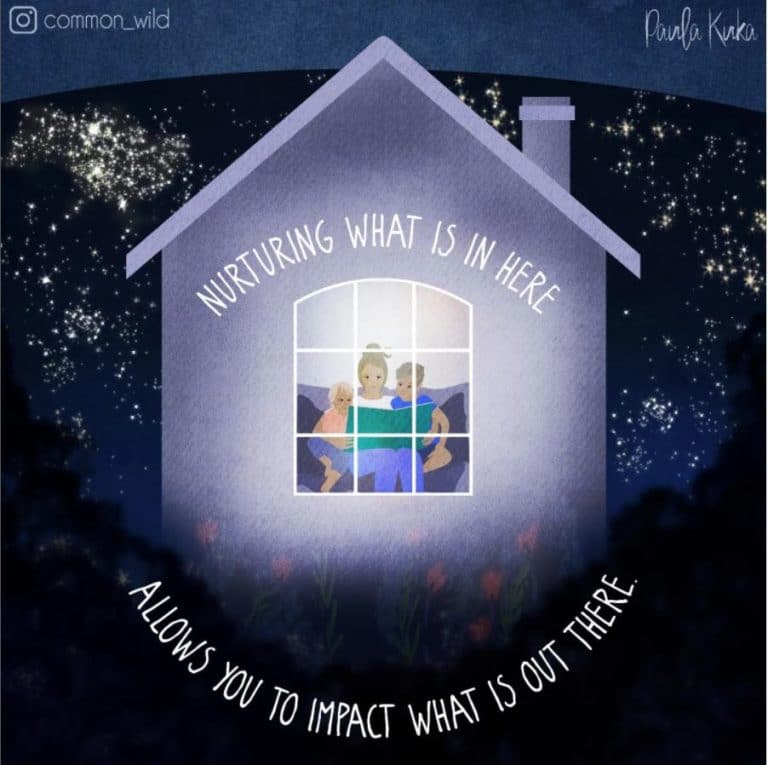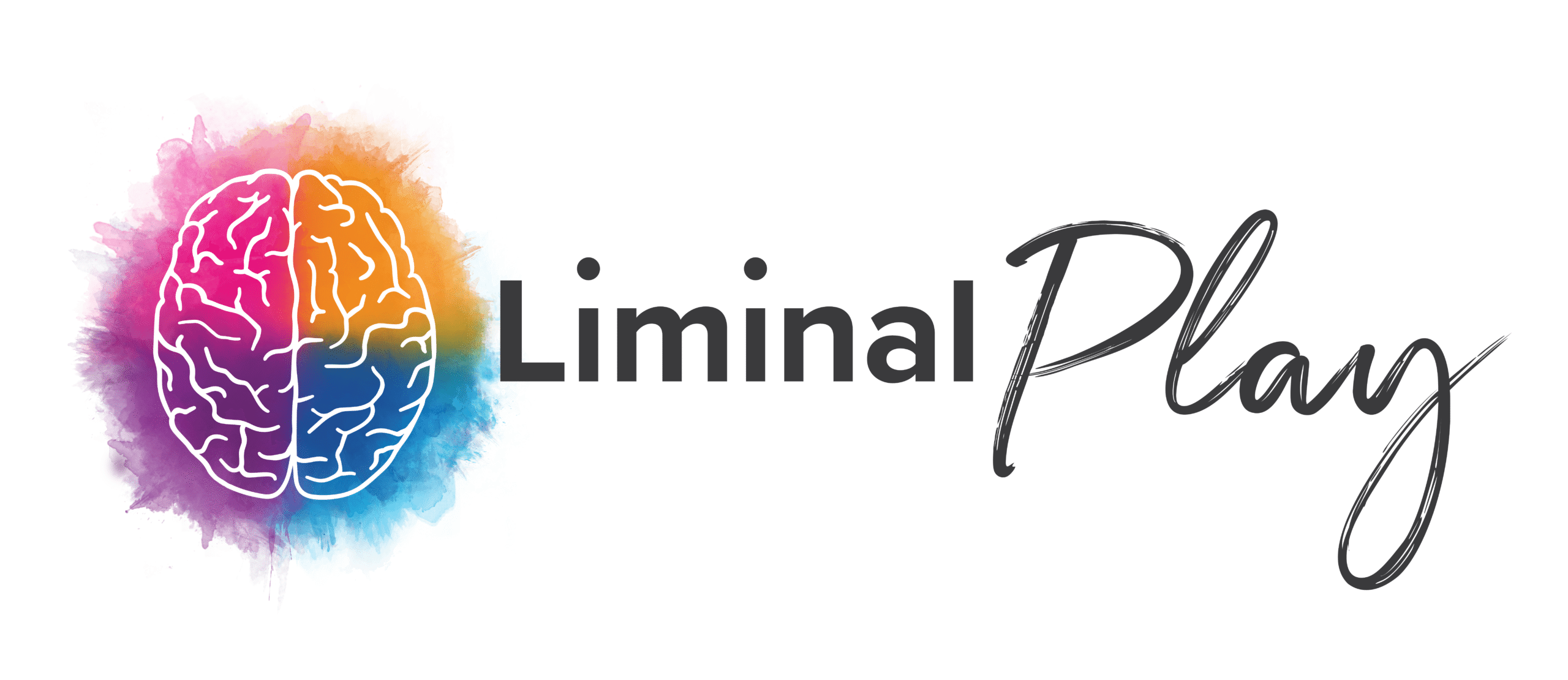Nurturing what is here
Published 4 March, 2022
Paula Kuka is a Western Australian artist, former landscape architect, and mother who has a knack for capturing the peculiarities of raising young humans. Her insights have made me chuckle and groan in equal measure, always feeling seen in the tumultuous emotional landscape of parenthood.
Today she shared this illustration and post:

“Senseless war and loss of lives. Catastrophic floods. Disastrous climate news. Horrifying racial injustice.
From my safe and dry vantage point it’s hard to know what to do.
I don’t have the answers but I do know this.
I know that how we parent tomorrow’s adults is crucial to the future of this broken world. And to do that I need to be informed and connected. I need to be well and whole. I need to make my children feel safe and their emotions validated.
I need to be in position to lend my voice, donate funds, raise awareness, call out injustice and reduce my foot print.
I need to stay busy. Keep working. Create Art. Show up.
But I also know that sometimes the nurturing starts under my own roof. That’s how I’ll be best equipped to have the greatest impact.” – Paula Kuka, @common_wild
Her short post is so rich with wisdom and insight for our days – regardless of whether you’re raising small humans or not – that I wanted to create a moment in time to explore these themes in more detail.
1. The paradox of life
The reality of life is that it is both beautiful and heart-breaking, mundane and profound in the same moments – many of us have the luxury to ignore this up to a certain point in our lives, but eventually we have to face this common human experience. Psychologist and emotions researcher Dr Susan David says it so beautifully, “Life’s beauty is inseparable from its fragility”. Life and death, joy and grief are woven into the cyclical nature of our world. Recognising and accepting the complexity of our emotional landscapes opens up more possibility for it all to find a place of peace.
Renown post-WWII paediatrician and psychoanalyst Donald Winnicott coined the term ‘good enough mother’, which speaks to the idea that our presence is more important than our perfection.
“I would rather be the child of a mother who has all the inner conflicts of the human being than be mothered by someone for whom all is easy and smooth, who knows all the answers, and is a stranger to doubt.” – D.W. Winnicott
Presence to what is both good and difficult in our lives allows for these experiences to be integrated, drawing us into a way of being that is more “whole and well” as Paula writes. Being able to hold paradox and sit in ambiguity are core competencies of adulthood, and allow us to ‘hold space’ for larger possibility to emerge.
2. Nurturing under our own roof
When I was 34, life (and new parenthood) conspired to bring to my attention just how much we are shaped by our childhood, and to what extent we bring this into our adult lives – in parenting, leading and intimate relationships. If we want to change the course of this river, that change has to begin within ourselves. By coming to understand this interplay of the past and the present, we have ways to shape the future.
Connecting to ourselves in this way allows us to deepen into our own inner sources of knowing and meaning. What soil am I rooted in? From what seeds have I grown? Where do I draw inspiration?
In our world where the dysfunctional ‘masculine’ abounds and strength is almost exclusively a display of force, there is an invitation to tap into a different type of strength, an archetypal ‘feminine’ power and grace. This force speaks to our connection to the earth and to generation past, present and future. It cuts through the rhetoric and shines a light into the realness of human lives beyond the labels of nationality, gender or religion.
This choice is available to each of us, regardless of gender. Understanding and growing our tap root allows us to become a life-giving source – a mother tree – in the forests in which we live.
3. The power of small moments
“Your life becomes the shape of the days you inhabit”, writes John O’Donohue in Anam Cara. There is a temptation to reach towards the biggest action, and then find that our motivation or capacity wanes quickly. But we can flip it on its head by asking ourselves “What’s the smallest meaningful action I can take?”.
In Paula’s intimate image we see her at home reading to her children.
We don’t know the words of the book but there is a clear sense of safety and connection in this moment. These repeated choices to foster small moments of human connection help kids become better able to respond to their own emotions and bring these skills into their adult lives. By demonstrating our love, courage and presence to our children in the small moments, we clearly communicate what matters to us in the bigger context. “Parenting is a cultural transmission of values”, writes Dr Tracy Cassels of Evolutionary Parenting.
As Paula says, “I know that how we parent tomorrow’s adults is crucial to the future of this broken world.”
This is not exclusive to parenting though. We don’t leave our neurobiology at the door of work, and our workplaces also play a profound role in our wellbeing (or lack thereof).
In her book A Human Moment, Dr Amy Bradley weaves together stories and research into a compelling picture of how small moments of presence and connection contribute to workplaces where people and businesses thrive. The choice to notice and be kind is available to everyone, but when the shape of leaders’ days includes small moments of compassion and care, the effect on the lives around them is particularly profound.
4. Creativity as meaningful action
“It gets harder and harder to sing in the dark times, but creativity needs to ramp up in the face of destruction”. – Jackie Morris, illustrator and author
Ask a person to think about meaningful action or meaningful work and they tend towards service to others – how can I make a difference or contribute to what’s needed? Paula mentions lending her voice and donating funds, but she also commits to creating art.
This isn’t as inexplicable as it may sound. Much has been written on artistic activism or creative activism, I’ve also shared about poetic activism.
Recently I’ve been learning about an approach called ‘The Map of Meaning’, developed by Prof Marjolein Lips-Wiersma, Lani Morris and Patricia Greenhough (a topic for a future blog). The original research and subsequent applications of the map highlight the vital importance of ‘expressing our full potential’ when considering meaning and meaningful work. Some people might talk about it as their fingerprint, their spark or creativity, or the beautifully articulated “sounding my unique note in the world”.
Surprise creates openings. Brené Brown writes, “The only unique contribution we will ever make in this world will be born of our creativity”.
Cultivating and expressing this creative essence is the birthing of something new into the world, something that comes from a deeper inner place – unique to each one of us – and brings vitality to the wider world.
In closing, I take from Paula’s beautiful words and image an invitation to widen the lens of what is meaningful – our being and doing, our solitude and our togetherness, the reality of the days in which we live and that which inspires us on.
Redefining strength and holding space for emergence is of such vital importance in a time when the old ways we understood the world are collapsing around us.
What will be your guide?
Notes and Acknowledgements
- A number of books have been directly or indirectly referenced here – ‘Emotional Agility’ by Susan David, ‘Parenting from the Inside Out’ by Daniel Siegal and Mary Hartzell, ‘Finding the Mother Tree’ by Susanne Simard, and ‘The Human Moment’ by Amy Bradley/Armstrong.
- In 2021 I had the privilege and pleasure to participate in a unique women’s personal and professional leadership programme led by Sarah Rozenthuler and Sarah-Jane Menato entitled ‘Leading with Power and Grace’. Scheduled again for July and December 2022, the two day programme weaves together women’s development theory, myth and archetype, poetry and systemic coaching and constellations. Highly recommended!
- I have also recently finished an introductory programme to ‘The Map of Meaning’, which has opened my eyes to new ways of understanding and creating meaning in our daily lives and work. Further information including the book ‘The Map of Meaningful Work’ can be found here. Expect to hear more from me soon!

